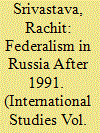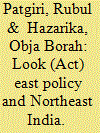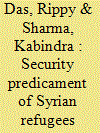|
|
|
Sort Order |
|
|
|
Items / Page
|
|
|
|
|
|
|
| Srl | Item |
| 1 |
ID:
190751


|
|
|
|
|
| Summary/Abstract |
This article examines the federalization process and the spread of federalism in Russia after 1991. The Russian federal system has undergone several changes since the collapse of the Soviet Union. It arose as a result of several contracts signed between the federal government and the subjects. The federal structure of Russia is asymmetric and characterized by conflicts due to the system of division of power between the federal government and the subjects. The creation of an institutional mechanism was done to facilitate the application of the federal principles effectively. The President’s full control over political affairs, foreign policy and the economy can harm the successful development of the federal state in Russia.
|
|
|
|
|
|
|
|
|
|
|
|
|
|
|
|
| 2 |
ID:
190753


|
|
|
|
|
| Summary/Abstract |
After the Arab uprising of the early 2010s which changed the geopolitical shape of the Eastern Mediterranean, the Abraham Accords in 2020 marked the second most momentous development of the past decade, which drove more external players to the scene of geopolitics of the Mediterranean region. The Abraham Accords improved Israel’s relations with some Arab states of the Persian Gulf such as the UAE, Bahrain and Saudi Arabia and paved their way, under the full support of the United States, to heavily partake in geopolitical and geostrategic equations, mainly in energy and security nature, of the Eastern Mediterranean formulated mainly by Greece under the Neo-Democracy government. The present research explores the changing character of geopolitics in the Mediterranean and how Greece is playing its role in restructuring such a character. The findings of this research suggest that Greece is playing a prominent and leading role in transforming the geopolitics of the Eastern Mediterranean through security and energy initiatives for protection against possible aggression from Turkiye. Considering the supreme importance of the Mediterranean commercially and militarily for the United States, this article argues that the new design of geopolitics in the region is being shaped to protect Greece and Israeli interests in favour of the USA in the Eastern Mediterranean.
|
|
|
|
|
|
|
|
|
|
|
|
|
|
|
|
| 3 |
ID:
190749


|
|
|
|
|
| Summary/Abstract |
Central to India–ASEAN relations have been a consistent equivalence between their similar core principles and outlooks, which have served as a shared value-based footing upon which the two entities have built and enhanced their relations. These underlying sets of norms inform their diplomatic dealings with each other, and stem from principles and practices critical to their foundational identities and experiences. This article investigates and evaluates the historical roots of these norms and then utilizes them as an analytical vehicle with which to trace the growing strategic convergence typifying present-day India–ASEAN relations. Drawing upon constructivist accounts that emphasize the role played by history, culture, identity and learning, the article considers the key areas of agreement in relations, and how a value-based form of analysis provides an essential lens through which to better understand material factors structuring their relations. It also underlines the analytical value and empirical richness that a norm-based approach provides for analyzing specific sets of norms in a specific state-to-multilateral interaction.
|
|
|
|
|
|
|
|
|
|
|
|
|
|
|
|
| 4 |
ID:
190750


|
|
|
|
|
| Summary/Abstract |
The underdevelopment of Northeast India is quite often explained in terms of economic isolation primarily on account of its geographical peripherality. To address this challenge, a new imagination, through the Look (Act) East Policy has been proposed. This approach, makes India’s Northeast the centre of a unified economic, physical and social space through its integration with the trans-border neighbouring regions. In this article, an attempt has been made to examine the logic of developing an ‘extended Northeast’ and how it has been sought to be realized. The article argues that the actualization of this proposed integrated space is ridden with serious difficulties and the internal fragmentation of Northeast India and the exceptional rules and administrative arrangement that are in place in the region along with the geopolitical compulsion of India may act as significant barriers in this regard. And most importantly there are apprehensions that the proposed integrated space may lead to the appropriation of resources of the Northeast by the corporate houses without benefiting the people of the region.
|
|
|
|
|
|
|
|
|
|
|
|
|
|
|
|
| 5 |
ID:
190752


|
|
|
|
|
| Summary/Abstract |
War has numerous repercussions for each gender. In the instances of war-induced displacement, both genders are usually subject to intensive risks in their journey as refugees, from reaching destined countries through dangerous routes to gender differences and inequalities they face in the host countries. The tales of agony and calamity shed light on the fact that the refugee crisis is very much a crisis for both genders not limited to one gender. Since the Second World War, the Middle East has been regarded as the world’s most conflict-prone region. Continuous Wars and civil wars have always raised questions about human threats and Syria is not exceptional. As a consequence of the Syrian civil war which was started in 2011, 13.5 million Syrians substituting for more than half of Syria’s population are deracinated, destitute or confined in difficult to access areas. Tens of thousands of Syrians have fled their nation in search of safety and access to essential amenities. Many Syrians choose to reach Europe other than Middle East countries as their destination to get asylum where they risk their lives by making the dangerous journey through the Mediterranean Sea route and both men and women face different refugee predicaments throughout their journey. At the same time, the European Union (EU) is playing a significant role in managing the Syrian Crisis, although it has been facing a remarkable advent of refugees and migrants. In 2015, the EU and Turkey officially followed a joint ‘Action Plan’, which mainly aimed to deter the gargantuan influx of outcasts and transients into the EU. However, the plan has faced a lot of criticism which argued that although the EU presented as a humanitarian actor in dealing refugee crisis, it is trying to push its responsibilities towards Turkey. Against this backdrop, this article has examined the crisis faced by the Syrian refugees after the adoption of the joint action plan. Further, it has analysed, if the said joint action plan has made their refugee journey more complicated in the EU by adding new challenges for both Syrian men and women differently.
|
|
|
|
|
|
|
|
|
|
|
|
|
|
|
|
| 6 |
ID:
190748


|
|
|
|
|
| Summary/Abstract |
The discipline of International Relations (IR) has been complicit in its representation of indigenous populations, often producing teleological narratives underpinning the superiority of the West and legitimizing colonial domination. The historical lived experiences of the indigenous peoples and their knowledge have been silenced and sidelined enabling the anchoring of discussions on political subjectivity and development from the vantage point of western modernity. The crisis of understanding modern statist practices of development plays out in the domain of ‘onto politics’—the politics of being whereby current governing practices are merely reflective of the colonial past. The practice of finance and the use of capital during the colonial era contributed to the embedding and actualization of colonial enlightenment thought on the inferiority of non-Europeans, while corollaries of money (property, trade) helped to produce implement hierarchies even amongst the indigenous colonized communities. The article is exploring a double relationship between knowledge production and practice: the first is how enlightenment scholars provided the rubric for racial hierarchies, and the second is the way money reified and reproduced those racist classifications through practice by looking at the colonial and post-colonial Indian state. In doing so, it advances the case to examine the relationship between indigeneity and knowledge production as constitutive to the modern Indian state.
|
|
|
|
|
|
|
|
|
|
|
|
|
|
|
|
|
|
|
|
|